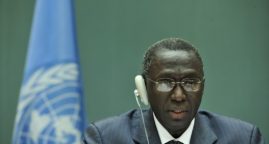Dismantling the Foreign Service
Article published on New York Times website on 11/27/2017 by Nicholas Burns
The Foreign Service, our country’s irreplaceable asset for understanding and interacting with a complex and dangerous world, is facing perhaps its greatest crisis. President Trump’s draconian budget cuts for the State Department and his dismissive attitude toward our diplomats and diplomacy itself threaten to dismantle a great foreign service just when we need it most.
The United States is facing an extraordinary set of national security challenges. While we count on our military ultimately to defend the country, our diplomats are with it on front lines and in dangerous places around the world. They are our lead negotiators as we work with our European allies in NATO to contain growing Russian power on the Continent. They are our lead negotiators seeking a peaceful end to the wars in Afghanistan, Iraq and Syria. Our diplomats are assembling the coalition of countries in East Asia to counter the irresponsible regime of the North Korean dictator, Kim Jong-un.
Foreign Service officers in more than 280 embassies and consulates aid American citizens in trouble overseas, help American companies overcome unfair barriers to trade and investment, coordinate counterterrorism and narcotics programs and manage development and humanitarian aid to distressed countries.
Diplomats negotiate the landing and basing arrangements for American troops overseas, such as at Central Command’s major Middle East base in Qatar. Our strongest and smartest presidents have known that integrating our diplomatic and military strategies is the most effective way to succeed in the world today.
Both of us served overseas and in Washington for decades as career diplomats. We were ambassadors during both Republican and Democratic administrations. We are proud of the nonpartisan culture of our brethren at the State Department. President Trump and Secretary of State Rex Tillerson can count on them to work tirelessly, loyally and with great skill for our country.
But we are concerned the Trump administration is weakening the Foreign Service by a series of misguided decisions since taking office. It has proposed a 31 percent budget reduction for the State Department that would cripple its global reach. It has failed to fill the majority of the most senior ambassadorial positions in Washington and overseas. It is on track to take the lowest number of new officers into the service in years.
It has even nominated a former officer with a scant eight years of experience to be the director general of the Foreign Service, the chief of its personnel system. The nonpartisan American Academy of Diplomacy (of which we both are members) advised Congress that this would be “like making a former Army captain the chief of staff of the Army.”
As a result, many of our most experienced diplomats are leaving the department. Along with the senior diplomats who were summarily fired by the Trump team early this year, we are witnessing the most significant departure of diplomatic talent in generations. The drop in morale among those who remain behind is obvious to both of us. The number of young Americans who applied to take the Foreign Service officer entry test declined by 33 percent in the past year. This is particularly discouraging and will weaken the service for years.
We are not arguing that the State Department is a perfectly functioning agency that requires no improvements. We support creating a culture of reform and renewal at the department. The Trump administration is right to look for budget and operational inefficiencies to ensure the best use of taxpayers’ money. We also agree with the American academy’s support for the elimination of more than 60 special envoy positions to save money and improve effectiveness. The Trump team should additionally consider shifting more positions from Washington to diplomatic posts overseas.
The recent decision by Mr. Tillerson to downsize the Foreign Service by up to 8 percent of the entire officer corps, however, is particularly dangerous. The Foreign Service, which has about 8,000 officers who do core diplomatic work, is a fraction of the size of the military. The service is already overwhelmed by the growing challenges to the United States on every continent. In our view, Mr. Tillerson has failed to make a convincing case as to why deep cuts will strengthen, rather than weaken, the service, and thus the nation. This is not about belt tightening. It is a deliberate effort to deconstruct the State Department and the Foreign Service.
That is why Congress must now exercise its constitutional responsibilities to overrule the most dangerous aspects of the administration’s plans. House and Senate committees must continue to oppose the huge budget cuts. Congressional committee chairmen should block the appointments of Trump nominees clearly unqualified for service. And Congress should ensure that there are sufficient funds to entice patriotic young Americans to join the Foreign Service. Senators John McCain, Republican of Arizona, and Jeanne Shaheen, Democrat of New Hampshire, are leading the bipartisan questioning of Mr. Tillerson’s hiring freeze and warning of its dire consequences.
We are ringing the village bell in alarm because Mr. Trump’s neglect of the State Department will harm our country at an already dangerous time. The Foreign Service is a jewel of the American national security establishment, with the deepest and most effective diplomatic corps in the world. All that is now at risk.
Nicholas Burns, a former under secretary of state and ambassador to NATO, teaches diplomacy and international relations at Harvard. Ryan C. Crocker, a former ambassador to Iraq and Afghanistan, is a lecturer at Princeton.
Related Articles
Resolution of Israel-Palestine conflict requires “leadership and vision”
Two-state solution for Israel and Palestine is “possible” – UN Secretary-General Ban Ki-moon –
Preserving the integrity of humanitarian negotiations
August 2013. Humanitarian negotiation is a special form of engagement, for exclusively humanitarian purposes, with communities, parties to armed conflict, governments and other actors. In armed conflicts and other situations of crisis, humanitarian negotiations can often be a necessity.
Where do we go from here? 1st Annual Grand Bargain Meeting
06/20/2017. “Together we were determined to reset our ways of working and refocus our efforts on achieving humanitarian gains” Peter Maurer.





